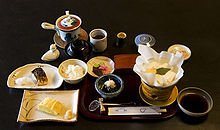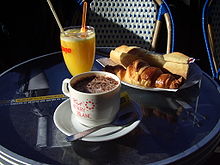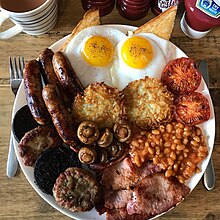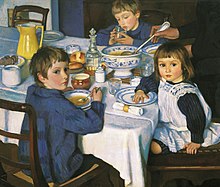breakfast

The breakfast ( Swiss Morgenessen or dialectically Zmorge , outdated and breakfast foods or Dejeuner ) is usually in the morning , taken to be the first meal of the day.
In Germany , Austria and Switzerland , breakfast often consists of a hot drink (usually coffee , tea , milk or cocoa ) as well as baked goods, primarily bread , toast or rolls (South German / Austrian rolls , wake ; Swiss Weggli ) with butter or margarine and, as a sweet spread, jam , honey , nut nougat cream or sugar beet syrup or as a salty topping, sausage or cheese . Other popular ingredients of breakfast in German-speaking countries are Quark (Austro plugs ) and yogurt , one egg or ham and eggs , granola , cereal , juice and fruit .
A special form is the brunch , which combines breakfast and lunch and is usually eaten in the late morning. The term "brunch" is an English case word and is made up of parts of the words br eakfast (breakfast) and l unch (lunch). Since brunch is often available in buffet form with a rich selection, it replaces breakfast and lunch at the same time in such cases and is therefore suitable for late risers.
Naming motifs
The name for the first meal of the day is based on different naming motifs in the different languages:
- The German word breakfast goes back etymologically to the 15th century and originally meant the piece of bread eaten early in the morning. The word replaced the previously common Middle High German expression Morgenbrōt .
- The English expression breakfast refers to the “breaking of the fast” after the night after eating the first food on the new day.
- The same motif is used in Spanish desayuno (= breakfast), derived from ayunar (= fast).
- The same applies to French : petit-déjeuner (= breakfast) literally means “breaking the fast”. Lunch is usually referred to as déjeuner (literally “breaking the fast”, jeûner = to fast); however, in some French-speaking regions breakfast is called this.
- The Portuguese pequeno almoço describes breakfast as “small lunch”, similar to French.
- In Italian , breakfast is called colazione (or prima colazione , literally “first meal”). This goes back to the church Latin expression collatio . In German, according to Meyer's Konversationslexikon , the corresponding foreign word collation has, among other things, the meaning “moderate supper on fasting days in monasteries, which is said to have resulted from the fact that a chapter from the Collationes patrum Sceticorum by Johannes Cassianus had to be read out in the evening meetings before dinner ; afterwards [the word collation meant ] a simpler meal generally enjoyed outside of the specific mealtime ”.
- The Swedish word frukost and Danish morgenmad (like breakfast and Middle High German morgenbrōt ) refer to the time of day at which the meal is eaten .
- The Dutch ontbijt (originally related to German snack ) literally describes breakfast as “biting into”.
The morning consumption of less food and more of luxury foods such as alcoholic beverages or cigarettes is attributed to particularly marginalized social groups. For this there are some regionally different, joking names such as "Nuttenfrühstück" or (in Austria :) " Sandler breakfast".
The importance of breakfast in different cultures

While breakfast as the first morning meal is a cross-cultural phenomenon , the design, rituals , timing, duration, but above all the scope and nutritional components of breakfast often differ considerably between and in different cultures .
A sweet breakfast is largely unknown in African and Asian cultures. In Northern and Central Europe, especially in Great Britain , breakfast is often the most important, central meal of the day and the outer setting for encounters with the whole family or domestic community. Regardless of this, many people in Europe and the USA forego breakfast today : Depending on the age and population group or definition of "breakfast", the percentage of "breakfast without breakfast" is 10% to 30%.
Coffee as a drink for breakfast gradually replaced wine and beer, which used to be common with all meals in the 18th century.
Health aspects
Eating breakfast appears to have a short-term positive effect on cognitive function in children and adolescents. This potential seems to be more pronounced in children who are already malnourished. However, the effects of breakfast composition and the long-term effects of breakfast are unclear due to insufficient studies in this area and problematic experimental arrangements.
On the other hand, a recent study refutes the commonly held view that a large breakfast helps you lose weight . The (incorrect) assumption here is that a rich meal in the morning has a long-lasting satiety effect . As a result, this ensures that you eat less with the other meals of the day and thus take in less energy from food throughout the day . According to the researchers, however, exactly the opposite is the case: an overly rich breakfast increases the daily energy balance instead of lowering it, since the additional energy absorbed at breakfast cannot be saved by holding back on other meals. The folk wisdom of having breakfast like an emperor, lunch like a king and dinner like a beggar may apply, but is therefore not maintained. Further studies show that it is basically irrelevant how the energy supply through food is distributed over the day, i.e. H. whether the main meal is taken in the morning, at noon or in the evening. What counts is only the sum of the energy consumed by food per day.
Typical breakfasts in the world
In this table, only the typical foods and drinks appear, which does not exclude that other foods and drinks are also consumed today or regionally.
| country | typical dishes | Typical drink | Remarks |
|---|---|---|---|
| Afghanistan | Afghan bread , qaimak ( kajmak ), cream cheese with almonds and fresh peppermint leaves , butter , jam (especially quince and apple jam), fried egg prepared with tomatoes, coriander, hot paprika and pepper. Halwa (dessert made from flour, sugar, oil and cardamom with walnuts), red (slightly sweet pastries), halim ( porridge ) | Green tea with cardamom or Qaimak Chai ( green tea cooked with milk, sugar and cardamom) | Tea and freshly baked bread are staples of the Afghan breakfast. |
| Egypt | Ful ( fava beans - Mus ), scrambled eggs , Chubz (bread), falafel | Tea , rarely coffee , juice | Often bread is also eaten with cream cheese and jam . |
| Australia | Breakfast cereals ; Toast with vegemite , grilled bacon and egg | Coffee, tea | |
| Brazil | Often bread rolls with butter or pão de queijo (cheese bread), ham , pastries and fruit . The Café Colonial is popular in the southern region. | Coffee, mostly black and with an unusually large amount of sugar for Europeans, often with milk, and orange juice | |
| Denmark | Wheat bread, whole grain bread, butter / margarine, cold cuts / cheese / egg, cereals, fruit, fermented dairy products, pastries / cakes / biscuits | Coffee, water, milk / mixed milk beverages, juice, tea | |
| Germany | Bread rolls, bread, butter, cheese , sausage , sweet spreads , fruit, muesli , cornflakes , eggs, yogurt | Coffee, tea, juice, milk | The German breakfast is usually available as a continental breakfast in (mainly European) countries . |
| Flanders | Baked goods (mainly bread, rolls, rusks and / or (yeast) plaits, which are either sweetened or unsweetened depending on the region) with spreads and pastries (cakes, muffins, noodles, Danish pastries, biscuits, cookies, etc.); Cheese, sausage, jam , sugar beet syrup , hailstones , honey , muesli (classic cereal mueslis or breakfast cereals), yogurt, quark , fruit, a soft or hard egg, scrambled and fried eggs , in hotels often bacon , oatmeal. | Coffee, tea, juice, milk | |
| Finland | Karelian pierogi , Mämmi , light and dark bread, sausage, pies, blue and cloudberries as well as other fruit and vegetables, smoked fish, herring | lots of coffee, tea, juice, milk | |
| France | Bread with a sweet spread (jam, honey, chocolate) or butter, croissants or other fine baked goods (often without any further spread); Breakfast cereals (more common in children); seldom also yoghurt or cheese. | Coffee with milk , black coffee, espresso , hot chocolate or juice | |
| Greece | Bougatsa or sesame rings | coffee | |
| Guatemala | White bread, corn bread, toast, scrambled eggs / fried eggs, black beans (mostly pureed ( "refritos")), roasted or fried plantain slices | Coffee, fruit juice | |
| Iran | Mast-o-Khiar (cold yogurt soup with mint and fresh vegetables), Asch (hot soup with vegetables and lentils), sheep cheese , halim ( porridge ), flatbread , yogurt, honey, jam (often carrot jam) | Black tea is often heavily sweetened, juice or Turkish coffee | During Ramadan and on Fridays, there is no eating or drinking after sunrise. Traditional breakfasts are rare in hotels, where variations of cream cheese, cheese, honey, yogurt, cucumber, tomatoes, olives, fried eggs and flatbread are served. In addition, coffee or tea, milk and juices. |
| Israel | Matze (unleavened thin bread), bread, puff pastries and cakes, butter, jam, eggs, cheese, olives, salad with tomato and cucumber, yoghurt, fruit, also smoked and marinated fish, antipasti | Coffee, tea, fruit juice, cold drinks | Typically very rich - apart from meat and sausage products due to a kosher diet. |
| Italy | Rusks , butter, jam, croissants (cornetto) (without filling or filled with pudding, jam or chocolate) | Caffè latte , cappuccino , black coffee or espresso | Mostly very economical breakfast, but in many hotels guests are offered cakes , fruit, cheese and sausage. |
| Japan | Traditional: rice , Tsukemono , fried fish, miso soup , Nori -Algen, natto (especially in eastern Japan). In private households often leftovers from the previous day's dinner. Western: Toast (usually wider and thicker than usual in Europe), jam. | Traditional: Japanese green tea . Western: coffee, black tea or royal milk tea , juice | Western breakfast is not uncommon in private households, especially among the younger generation, while traditional breakfasts predominate in the older generation and in ryokans (traditional Japanese hotels). In international hotels there is a choice between traditional Japanese breakfast and Western breakfast buffet. |
| Mexico | Various sweet baked goods, fruit, but also warm dishes with Mexican tortillas . | Coffee, a type of milk coffee, prepared with very strong, somewhat thick coffee (not espresso) | |
| Netherlands | Bread / crackers , dairy products, fruit, eggs. | Coffee, tea, juice, milk | |
| Austria | Baked goods (mainly bread, rolls, rusks and / or (yeast) plaits, which are either sweetened or unsweetened depending on the region) with spreads and pastries (cakes, muffins, noodles, Danish pastries, biscuits, cookies, etc.); Cheese, sausage, jam , sugar beet syrup , honey , muesli (classic cereal mueslis or breakfast cereals), yogurt, quark , fruit, a soft or hard egg, scrambled and fried eggs , in hotels often also bacon , porridge. | Coffee, tea, juice, milk | |
| Philippines | Rice, fruit, scrambled eggs with bacon, hot dogs, dried fish (bulad). | Coffee, cocoa | |
| Poland | A hot milk porridge , oatmeal (owsianka), or a milk soup with noodles or other fillings, then a couple of sandwiches with sausage or layered cheese and jam . Scrambled eggs or boiled eggs with a few slices of bread or rolls, or a selection of sausages and cheeses and vegetables such as cucumber and tomatoes . | Choice of tea, grain coffee, coffee or cocoa (in order of popularity) | Recently, cereals and muesli have also become increasingly popular. |
| Russia | Milk porridge is typical in Russia for breakfast, boiled or fried egg , butter or cheese bread, sweet spread | Coffee, cocoa, tea | |
| Sweden | Crisp bread , fish, porridge or filmjölk , cheese bread, often also Köttbullar , eggs, bread and rolls with sweet and / or savory toppings. | Coffee or tea, juice | |
| Switzerland | Sandwiches with jam, honey or nut nougat cream; less often sandwiches with cheese or cold cuts; on Sunday braid instead of bread; Scrambled eggs, boiled eggs or fried eggs, less often with bacon; Muesli or corn flakes; Yogurt; Semolina or porridge; rarer (especially in the country) hash browns; fruit | Coffee, milk coffee ("bowl"), milk, Ovaltine , tea, cocoa; with orange juice or similar. | There are strong regional differences. |
| Spain | Croissants, churros or chocolate con churros or other fine baked goods. Bread with olive oil , tomato and ham | Coffee, tea or orange juice | mostly very economical breakfast |
| Turkey | White bread (often simit ), brine cheese , olives , tomatoes, cucumbers, kajmak , yoghurt | Black tea , (rarely coffee, milk) | |
| Uganda | Beans with rice, corn porridge or the like, chapati (comparable to pancakes), mandazi (comparable to donuts), fried or boiled sweet potatoes or manioc wedges, porridge, rarely omelets in combination with chapati (“Rolex”). Western: Toast with salted butter, jam or peanut or sesame paste (hardly common) | heavily sweetened black tea or milk tea | Breakfast is only eaten around 10 in Uganda |
| United States | Mainly breakfast cereals, egg dishes , bacon or toast. | Coffee and orange juice | See: American Breakfast . Regionally very different. |
| United Kingdom , Ireland | Full English breakfast , bacon sandwich, toast with jam. In Ireland there are sometimes also fried mushrooms . | tea | |
| Vietnam |
Traditional: Phở (rice noodle soup) with beef, fish or chicken
Western: pancakes with bananas or other fruit, baguette with jam, fruit |
Vietnamese green tea, coffee (with sweetened condensed milk) | |
| People's Republic of China | Rice soup , noodle soup , flatbread ( Shaobing , or in western China Nang ), soy milk , dough sticks , salted vegetables and other warm dishes. | Chinese green tea |
Breakfast categories in German-speaking accommodation providers
Different terms are used to categorize the breakfast offer in accommodation establishments . In German-speaking countries these are: simple breakfast, extended breakfast, breakfast buffet. What exactly is meant by this is defined by the hotel and restaurant associations of Germany, Switzerland and Austria ( DEHOGA , Hotelleriesuisse , Austrian Chamber of Commerce ) based closely on DIN EN ISO 18513:
A simple breakfast (continental breakfast) is a breakfast that includes at least bread, butter, jam and / or jam and a hot drink.
The French breakfast with croissants counts as a simple breakfast (croissant breakfast).
The whole-grain breakfast (petit déjeuner aux céréales, whole-meal breakfast) includes whole-grain pastries.
An extended breakfast consists of at least one hot drink (optionally tea or coffee), a fruit juice, a fruit salad / fruit and a selection of bread / rolls, butter, jam, sausage and cheese.
A breakfast buffet must consistently have a larger size than the extended breakfast for the three associations mentioned.
The guest can order a breakfast on the floor (petit déjeuner dans la chambre, breakfast in guest's room) as a simple or extended breakfast in the hotel room.
However, there are two deviations: Egg / egg dishes and muesli are already required in Austria for an extended breakfast. In Germany they are only mentioned at the buffet, in Switzerland they are not mentioned at all. Hotelleriesuisse, on the other hand, is the only one of the three associations to require cold drinks at a breakfast buffet.
In 2019, the Federal Fiscal Court agreed to a lower court confirming that, according to the general view of life in Germany, sausage and cheese are an "integral part" of breakfast and at least one spread. Merely unloaded rolls with coffee do not constitute breakfast from this point of view.
Second breakfast
In many areas and ways of life one is during the morning snack occupied named differently depending on the region. Often this takes place together with colleagues. From this the term breakfast director is derived , which describes a manager who has been relieved of their actual responsibility.
photos
Typical breakfast in China
Breakfast in Italy , cappuccino
Croissant , typical breakfast pastry
literature
- Anna Stahltz: Food consumption and nutrient intake in children of the Germany-wide EsKiMo study with special consideration of social status . Paderborn 2008, DNB 994743181 ; Dissertation University of Paderborn 2009, urn : nbn: de: hbz: 466-20090520010 (PDF; 1.6 MB) 265 pages (3 files).
Web links
Individual evidence
- ↑ Wolfgang Pfeifer (edit.): Etymological dictionary of German . 7th edition. dtv, Munich 2004, ISBN 3-423-32511-9 .
- ↑ collation . In: Meyers Großes Konversations-Lexikon . 6th edition. Volume 11, Bibliographisches Institut, Leipzig / Vienna 1907, p. 264 .
- ↑ Jan de Vries: Nederlands Etymologische Woordenboek , 1971, quoted in. n. etymologiebank.nl accessed on July 11, 2011.
- ↑ GC Rampersaud et al .: Breakfast habits, nutritional status, body weight, and academic performance in children and adolescents . In: J Am Diet Assoc . 105, No. 5, 2005, pp. 743-760. PMID 15883552 .
- ^ Annerose Menninger: Enjoyment in cultural change. Tobacco, Coffee, Tea and Chocolate in Europe (16th – 19th Centuries). Stuttgart 2004, p. 424.
- ^ Katie Adolphus, Clare L Lawton, Claire L Champ, Louise Dye: The Effects of Breakfast and Breakfast Composition on Cognition in Children and Adolescents: A Systematic Review . PMC 4863264 (free full text)
- ↑ V. Schusdziarra et al .: Impact of breakfast on daily energy intake - absolute on analysis of versus relative breakfast calories . In: Nutr J . 10, No. 1, 2011, p. [Epub ahead of print]. PMID 21241465 .
- ↑ EL Sullivan et al .: Evidence in female rhesus monkeys (Macaca mulatta) that nighttime caloric intake is not associated with weight gain . In: Obes Res . 13, No. 12, 2005, pp. 2072-2080. PMID 16421340 .
- ^ AK Kant et al .: Evening eating and subsequent long-term weight change in a national cohort . In: Int J Obes Relat Metab Disord . 21, No. 5, 1997, pp. 407-412. PMID 9152744 .
- ↑ Breakfast like an emperor… . forum.ernahrung - Association for the promotion of nutritional information. Retrieved January 19, 2011.
- ↑ a b Sisse Fagt, Jeppe Matthiessen, Camilla Thyregod, Karsten Kørup, Anja Biltoft-Jensen: Breakfast in Denmark. Prevalence of Consumption, Intake of Foods, Nutrients and Dietary Quality. A Study from the International Breakfast Research Initiative. Retrieved November 13, 2018 . (PDF, 1.3 MB)
- ↑ Germany eats that for breakfast. In: YouGov.de. Retrieved September 26, 2016 .
- ^ Federal study from 2012 on the subject of breakfast habits. (No longer available online.) Archived from the original on February 2, 2015 ; accessed on February 2, 2015 . Info: The archive link was inserted automatically and has not yet been checked. Please check the original and archive link according to the instructions and then remove this notice.
- ^ Holger Hofmann: Culinary Greece. Ceres-Verlag 1982, p. 12
- ↑ Most frequently consumed products for breakfast in the Netherlands in 2017, by type. In: Statista.com. Accessed January 30, 2018 .
- ↑ ABC News Poll: What's for Breakfast? (PDF; 19 kB) In: ABCNews.go.com. Retrieved May 12, 2017 .
- ↑ a b How do you like your eggs in the morning? In: Daily Mail , June 3, 2014
- ^ F. Jürgen Herrmann: Textbook for cooks . Handwerk und Technik, Hamburg 1999, ISBN 3-582-40055-7 , p. 379 .
- ↑ hotelsterne.de . Hotel classification by DEHOGA, hotelleriesuisse.ch . Hotelleriesuisse, hotelsterne.at . Professional Association of the Hotel Industry of the Austrian Chamber of Commerce. Accessed April 6, 2011.
- ↑ BFH confirms the lower court. A dry roll and coffee are not breakfast. In: Legal Tribune Online . July 19, 2019, accessed July 31, 2019 .








